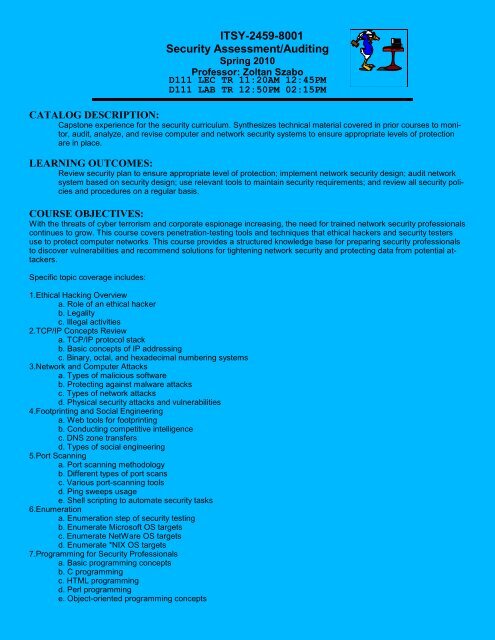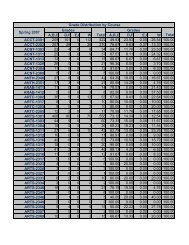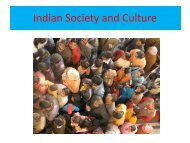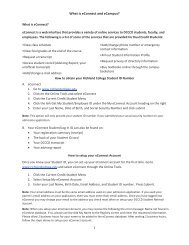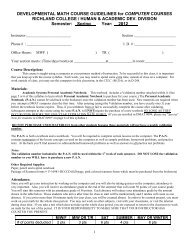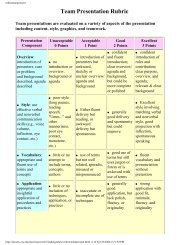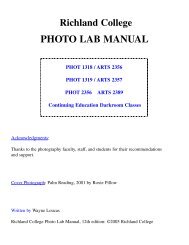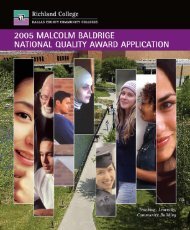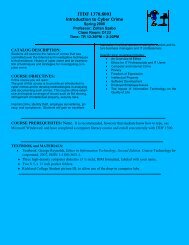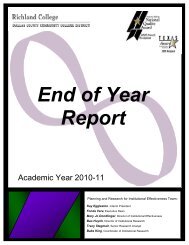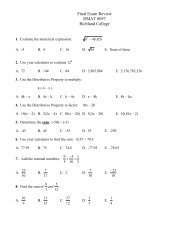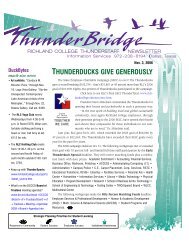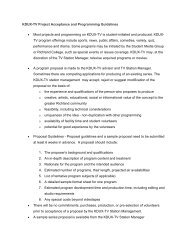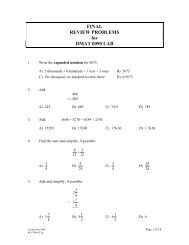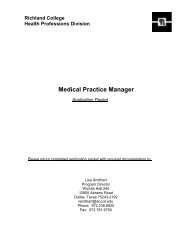Sample Syllabus - Richland College
Sample Syllabus - Richland College
Sample Syllabus - Richland College
Create successful ePaper yourself
Turn your PDF publications into a flip-book with our unique Google optimized e-Paper software.
ITSY-2459-8001<br />
Security Assessment/Auditing<br />
Spring 2010<br />
Professor: Zoltan Szabo<br />
D111 LEC TR 11:20AM 12:45PM<br />
D111 LAB TR 12:50PM 02:15PM<br />
CATALOG DESCRIPTION:<br />
Capstone experience for the security curriculum. Synthesizes technical material covered in prior courses to monitor,<br />
audit, analyze, and revise computer and network security systems to ensure appropriate levels of protection<br />
are in place.<br />
LEARNING OUTCOMES:<br />
Review security plan to ensure appropriate level of protection; implement network security design; audit network<br />
system based on security design; use relevant tools to maintain security requirements; and review all security policies<br />
and procedures on a regular basis.<br />
COURSE OBJECTIVES:<br />
With the threats of cyber terrorism and corporate espionage increasing, the need for trained network security professionals<br />
continues to grow. This course covers penetration-testing tools and techniques that ethical hackers and security testers<br />
use to protect computer networks. This course provides a structured knowledge base for preparing security professionals<br />
to discover vulnerabilities and recommend solutions for tightening network security and protecting data from potential attackers.<br />
Specific topic coverage includes:<br />
1.Ethical Hacking Overview<br />
a. Role of an ethical hacker<br />
b. Legality<br />
c. Illegal activities<br />
2.TCP/IP Concepts Review<br />
a. TCP/IP protocol stack<br />
b. Basic concepts of IP addressing<br />
c. Binary, octal, and hexadecimal numbering systems<br />
3.Network and Computer Attacks<br />
a. Types of malicious software<br />
b. Protecting against malware attacks<br />
c. Types of network attacks<br />
d. Physical security attacks and vulnerabilities<br />
4.Footprinting and Social Engineering<br />
a. Web tools for footprinting<br />
b. Conducting competitive intelligence<br />
c. DNS zone transfers<br />
d. Types of social engineering<br />
5.Port Scanning<br />
a. Port scanning methodology<br />
b. Different types of port scans<br />
c. Various port-scanning tools<br />
d. Ping sweeps usage<br />
e. Shell scripting to automate security tasks<br />
6.Enumeration<br />
a. Enumeration step of security testing<br />
b. Enumerate Microsoft OS targets<br />
c. Enumerate NetWare OS targets<br />
d. Enumerate *NIX OS targets<br />
7.Programming for Security Professionals<br />
a. Basic programming concepts<br />
b. C programming<br />
c. HTML programming<br />
d. Perl programming<br />
e. Object-oriented programming concepts
8.Microsoft Operating System Vulnerabilities<br />
a. Tools available to assess Microsoft system vulnerabilities<br />
b. Vulnerabilities of Microsoft operating systems<br />
c. Vulnerabilities of services running on Microsoft operating systems<br />
d. Harden Microsoft systems against common vulnerabilities<br />
e. Best practices for securing Microsoft systems<br />
9.Linux Operating System Vulnerabilities<br />
a. Fundamentals of the Linux operating system<br />
b. Vulnerabilities of the Linux operating system<br />
c. Linux remote attacks<br />
d. Countermeasures for protecting the Linux operating system<br />
10.Hacking Web Servers<br />
a. Web applications<br />
b. Web application vulnerabilities<br />
c. Tools used to attack Web servers<br />
11.Hacking Wireless Networks<br />
a. Wireless technology<br />
b. Wireless networking standards<br />
c. Process of authentication<br />
d. Wardriving<br />
e. Wireless hacking and tools used by hackers and security professionals<br />
12.Cryptography<br />
a. The history of cryptography<br />
b. Symmetric and asymmetric cryptography algorithms<br />
c. Public key infrastructure (PKI)<br />
d. Possible attacks on cryptosystems<br />
13.Protecting Networks with Security Devices<br />
a. Network security devices<br />
b. Firewall technology<br />
c. Intrusion detection systems<br />
d. Honeypots<br />
14.Business and IA Policy Integration<br />
a. Threat MOdeling to ensure Business Continuity<br />
b. Mandates and Law<br />
c. Policies ( people, operation, technology )<br />
d. Preparing for the Unknown<br />
15.System Auditing ( OVAL, nessus, MSBA )<br />
a. Existing and Recommended Security Controls<br />
b. Following Government guidelines<br />
c. PCI certification<br />
d. NIST 800-37<br />
COURSE PREREQUISITES: None. It is recommended, however that students know how to<br />
type, use Microsoft Windows and have completed a computer literacy course.<br />
TEXTBOOK and MATERIALS:<br />
Michael Simpson, ISBN 13: 978-0-619-21708-2, ISBN 10: 0-619-21708-1, Publish date: October 19, 2005<br />
Three high-density computer diskettes (3 ½ inch), IBM formatted, labeled with your name.<br />
Two 8 ½ x 11 inch pocket folders.<br />
<strong>Richland</strong> <strong>College</strong> Student picture ID, to allow use of the drop-in computer labs.
SCANS COMPETENCIES (Secretary’s Commission of Achieving Necessary Skills)<br />
Foundation Skills<br />
● Read, write, perform arithmetic and mathematical operations, listen, and speak effectively.<br />
● Think creatively, make decisions, solve problems, visualize, know how to learn, and reason effectively.<br />
● Display responsibility, self-esteem, sociability, self-management, integrity, and honesty.<br />
Workplace Competencies<br />
● Identify, organize, plan, and allocate resources effectively.<br />
● Acquire and use information.<br />
● Work with others effectively.<br />
● Understand complex interrelationships.<br />
● Work with a variety of technologies<br />
Institution Policies<br />
ADA statement<br />
Religious holidays<br />
Academic dishonesty<br />
Withdrawal policy (with<br />
drop date)<br />
Repeating this course<br />
Disclaimer reserving right<br />
to change syllabus<br />
If you are a student with a disability and/or special needs who requires<br />
accommodations, please contact the college Disability Services<br />
Office.<br />
Absences for observance of a religious holy day are excused. A student<br />
whose absence is excused to observe a religious holy day is allowed<br />
to take a make-up examination or complete an assignment<br />
within a reasonable time after the absence.<br />
Scholastic dishonesty is a violation of the Code of Student Conduct.<br />
Scholastic dishonesty includes, but is not limited to, cheating on a test,<br />
plagiarism, and collusion.<br />
As a college student, you are considered a responsible adult. Your<br />
enrollment indicates acceptance of the DCCCD Code of Student Conduct<br />
published in the DCCCD Catalog.<br />
https://www1.dcccd.edu/cat0506/ss/code.cfm<br />
If you are unable to complete this course, it is your responsibility to<br />
withdraw formally. The withdrawal request must be received in the<br />
Registrar’s Office by (semester’s drop date). Failure to do so will result<br />
in your receiving a performance grade, usually an “F.” If you<br />
drop a class or withdraw from the college before the official<br />
drop/withdrawal deadline, you will receive a “W” (Withdraw) in each<br />
class dropped.<br />
Effective for Fall Semester 2005, the Dallas County Community <strong>College</strong>s<br />
will charge additional tuition to students registering the third or<br />
subsequent time for a course. All third and subsequent attempts of<br />
the majority of credit and Continuing Education/Workforce Training<br />
courses will result in additional tuition to be charged. Developmental<br />
Studies and some other courses will not be charged a higher tuition<br />
rate. Third attempts include courses taken at any of the Dallas County<br />
Community <strong>College</strong>s since the Fall 2002 Semester.<br />
The instructor reserves the right to amend this syllabus as necessary.<br />
ATTENDANCE POLICY: It is expected that students will attend class regularly. Class attendance is 5% of<br />
the course grade. Students who will be absent from class for the observance of a religious holiday will be allowed<br />
to makeup examinations or assignments missed that day IF their instructor was notified not later than the<br />
15 th day of the semester. Please refer to the college catalog Student Obligations- Attending Classes section.
WITHDRAWAL AND IMPORTANT DATES: The deadline for receiving a "W" is indicated on the academic<br />
calendar and the current class schedule.<br />
For sixteen week classes:<br />
•Last day to drop a class without a “W” - Monday, February 1<br />
•Last day to drop a class with a “W” - Thursday, April 15<br />
Refund Dates<br />
Refunds may take up to 30 days to process. To receive a 100% refund you must drop before the first day of the<br />
semester.<br />
For sixteen week classes withdraw:<br />
•Before January 19 - 100% refund<br />
•January 19 - February 4 - 70% refund<br />
•February 5 - 10 - 25% refund<br />
•On or After February 11 - No refund<br />
For flex term, fast track and mini-mester classes:<br />
Students must withdraw PRIOR to the first class day of the semester to receive a 100% refund.<br />
If your class does not start on the first day of the semester and end on the last day of the semester, your refund<br />
dates could be different than the ones listed above. Please contact the Admissisons Office or Business Office for<br />
the refund schedule.<br />
Holidays - No Classes/Admissions/Registration<br />
•Martin Luther King Jr. Day - January 18<br />
•District Conference Day/Staff Development Day* - March 4-5<br />
•Spring Break - March 15 - 19<br />
•Campus Closed - March 19<br />
•Spring Holiday - April 2<br />
DISABILITY SERVICES/SPECIAL SERVICES:<br />
Student with a disability and/or special needs that requires ADA accommodations should contact the <strong>Richland</strong><br />
<strong>College</strong> Disability Services Office, T120, (972) 238-6180.<br />
COMPUTER/INTERNET POLICY:<br />
<strong>Richland</strong> <strong>College</strong> students, have access to the Del Rio computer labs for educational and instructional purposes.<br />
You are required to show your <strong>Richland</strong> Student ID when requested by lab personnel. You are expected to<br />
follow lab policies as well as the Student Code of Conduct specified in the catalog. <strong>Richland</strong> Computer Lab<br />
cannot provide any software for outside use.<br />
https://www1.dcccd.edu/cat0506/ss/computer.cfm<br />
TUTORING AND OTHER ASSISTANCE POLICIES:<br />
Tutoring is available through the Center for Teaching and Learning Connections ((972) 238-6226, Medina 216)<br />
and the Del Rio lab D229 ((972) 238-6317, large counter center of second floor). Generally, one hour per week<br />
is free.<br />
SAFETY POLICY: It is important for students to participate in this class in a safe, appropriate manner. We<br />
occasionally have to step over cords for the multimedia cart and/or computer equipment. We also need to watch<br />
out for boxes and paper, students’ backpacks, etc. During the first few labs, you will be encouraged to build<br />
good computing habits, designed to prevent eyestrain, carpal tunnel syndrome, etc.
CAMPUS FOOD AND DRINK POLICY: No eating or drinking is allowed at the computer tables in the lab<br />
rooms. Students, who wish to eat or drink in the lecture room, must sign the Statement of Responsibility, an<br />
agreement to be responsible for removing cans, bottles, and trash, from the learning environment.<br />
TESTING: There are two testing elements; short Unit Quizzes and three Major tests. All quizzes and tests will<br />
be Closed Book, unless notified in advance. No make-up quizzes or exams will be given!!!!!!<br />
DUE DATES: Unit quizzes for this material will be given during the first ten minutes of a class meeting.<br />
DE# indicates the opportunity to present a "Discovery Event" reports for that discovery period.<br />
LABORATORY ASSIGNMENTS: There are 15-17 Laboratory Assignments (LA). Laboratory Assignments<br />
will be completed in the lab and no makeup will be allowed. Labs are for your own benefit. You can simulate<br />
some of the labs using TestOut software in the open lab ( on your own time ). The default login id and password is<br />
your student id. First, you need to login to the network as ITCC and no password to use the software. Make sure<br />
you change your password after your first login.<br />
DISCOVERY EVENTS: Extra credit. This option involves classroom presentation of any current event related<br />
in the IT field to the subjects learned prior to the upcoming DE. Each student required to choose 2 dates to present<br />
2 independent findings about new technology, improvement to existing technology or PC component. Each<br />
presentation should not exceed 10 minutes and presentation style chosen individually. A written presentation must<br />
be handed in by each student for each presentation to earn a grade. Valued at 10% of the final grade.<br />
Important: These requirements are cumulative. There are three scheduled periods, as indicated on the<br />
Assignment Schedule, to make up the two DE's. A missed chance for a discovery period is lost and may not be<br />
recovered.<br />
Supplementary information: Available on campus, in D257 computer lab by accessing<br />
G:\Data\Szabo\ITSY2459. The folder contains class notes, PowerPoint slides, class announcements, the course<br />
syllabus, test dates, and other information for the course. Read<br />
Grading and Evaluation Criteria<br />
40% of the grade is based on a midterm and a final examination. Both examinations are cumulative and given in a varied<br />
format. An in-class review will be held prior to each examination.<br />
20% of the grade is based on quizzes. Quizzes are announced one day in advance and can vary from three to five questions<br />
and that might be in any format.<br />
40% of the grade is based on keeping a project notebook. Students are asked to obtain a small notebook or to use a lab<br />
notebook and keep notes on the results of Hands-on Projects and Case Projects at the end of each chapter in the text.<br />
A 90 - 100<br />
B 80 - 89<br />
C 70 - 79<br />
D 60 - 69<br />
F 59 below<br />
INSTRUCTOR DATA: Zoltan Szabo Office: (972) 238-6059<br />
Office Location: Del Rio Building, D112 E-Mail: zszabo@dcccd.edu<br />
Office Hours:<br />
By appointment only<br />
Division Office: B101, Phone: 238-6074 Lab: D257; (972) 238-6317<br />
COURSE OUTLINE and/or ASSIGNMENT SCHEDULE:
Week<br />
Topics<br />
LAST DAY TO DROP WITH A “W” Thursday, April 15<br />
Chapter<br />
Readings<br />
Exams<br />
1<br />
Intro<br />
Chapter 1<br />
Ethical Hacking Overview<br />
2<br />
1/19, 1/21<br />
TCP/IP Concepts Review<br />
Chapter 2<br />
3<br />
1/26, 1/28<br />
Network and Computer Attacks<br />
Chapter 3<br />
4<br />
2/2, 2/4<br />
Footprinting and Social Engineering<br />
Chapter 4<br />
5<br />
2/9, 2/11<br />
Port Scanning<br />
Chapter 5<br />
6<br />
2/16, 2/18<br />
Enumeration<br />
Chapter 6 Mid-term Exam<br />
7<br />
2/23, 2/25<br />
Programming for Security Professionals<br />
Chapter 7<br />
8<br />
3/2, 3/4<br />
Microsoft Operating System Vulnerabilities<br />
Chapter 8<br />
9<br />
3/9, 3/11<br />
3/15 – 3/19 SPRING BEAK OFF Spring Break<br />
10 Microsoft Operating System Vulnerabilities<br />
3/23, 3/25<br />
11 Linux Operating System Vulnerabilities<br />
3/30, 4/1<br />
12 Linux Operating System Vulnerabilities<br />
4/6, 4/8<br />
13 Hacking Web Servers<br />
4/13, 4/15<br />
14 Hacking Wireless Networks<br />
4/20, 4/22<br />
Cryptography<br />
15<br />
Protecting Networks with Security Devices<br />
4/27, 2/29<br />
16<br />
Business and IA Policy Integration<br />
System Auditing ( OVAL, nessus, MSBA )<br />
Review<br />
5/4, 5/6<br />
Chapter 8<br />
Chapter 9<br />
Chapter 9<br />
Chapter 10<br />
Chapter 11<br />
Chapter 12<br />
Chapter 13<br />
Chapter 14<br />
Chapter 15<br />
17 5/11 Final Exam Final Exam


